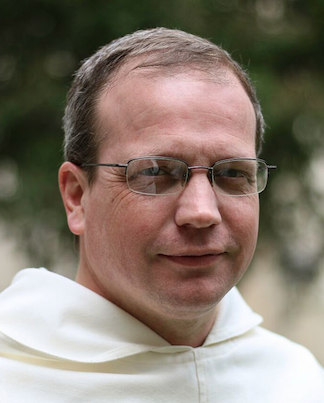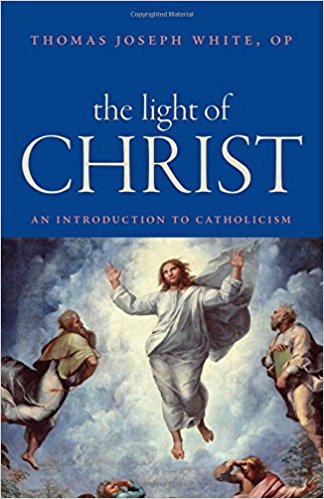My son John Paul once asked me for something he could read about Catholicism. I suggested Joseph Ratzinger’s Introduction to Christianity. He’s sophisticated and well-read, in philosophy and theology, among other subjects, and therefore balked at what seemed too elementary. But he gave it a try. I asked him later what he thought: “Dad, that’s not just an introduction.” To be sure. The same could be said – and I’m thinking of trying that experiment again on him and others – with Fr. Thomas Joseph White’s new book The Light of Christ: An Introduction to Catholicism.
The survival of the Church in the developed world depends on the existence of two groups of people, one small and one large. The smaller group, as has always been the case, are those who can study arguments and absorb them in a living way. Our democratic reflexes balk at this, but as Aquinas saw in his own day, most people don’t have the time, or inclination, or philosophical bent to study sacred doctrine. Plus the questions are hard and generate many errors. (Contra Gentiles, Book 1, chapter 4) Modern technological means and widespread literacy have enlarged the pool, somewhat, but it’s still the case that only the few are going to be able to “give a reason for what we believe.”
That’s why it’s important that those who do have the time and gifts present themselves as authorities that the larger group of believers can trust. You may, for example, have some knowledge of biology and chemistry and modern medicine, but there’s a reason why you go to a doctor instead of foolishly thinking you can treat yourself. All of us understand that, in various worldly matters, there are people with demonstrable knowledge and practical capacities that we do not have.
There was a time when the same was evident about religion and spiritual matters, which are both simpler in a way and more difficult to work out for yourself. But a combination of an individualistic notion of religion – who is anybody to tell me anything about God, or about anything? – and, let’s admit it, behavior by Church authorities that discredited their authority – has left many people without a shepherd, even with the assumption that there are no shepherds.
That’s why Fr. Thomas Joseph White is so important. He not only knows many things (he’s a Dominican, after all) that we need if we are to lead rich, productive lives. He’s offered his knowledge in a straightforward, believable way that encourages us to look with confidence to him and to the others like him in an age when it’s believed to be a bit of an embarrassment to look for light from others in our religious quest. But we must do that or stumble around in the darkness – which is why The Light of Christ is such an important and valuable book. A book chockfull not only of information and analysis but – let’s not be embarrassed to say this – of wisdom.
Among its many virtues is that you can read it two ways. Straight through, of course, and it will develop an orderly set of arguments, beginning with why at least entertaining the possibility of God’s existence is more rational than the dogmatic narrowing of reason we see among many in the culture. In his encyclical Fides et Ratio, John Paul II talks about many kinds of reason, but singles out that above all, today, we need a reason of “true metaphysical reach.” In other words, a more ambitious and wide-ranging use of reason than many scientists, even many philosophers and theologians, would allow today.
You can follow where that opening leads in the book in chapters on subjects like the Trinity, Creation and the human person, the Church, Social Teachings, Last Things, and – finally – Prayer.
I don’t know if Fr. White will thank me for saying this, but there’s a second way to read this volume. You can dip into each of these chapters on their own, too, for mini-treatises of real intellectual substance with valuable references to authoritative figures from the whole of the tradition. I’ve tried it both ways and can say that it will sit near my desk in the future as a reference.
I can almost hear an impatient voice asking: great, but is any of that stuff useful? That question is usually somewhat misleading because it assumes that we measure what’s useful by yardsticks of economics, foreign policy, domestic cultural disputes, and so forth. Aquinas says also towards the beginning of the Contra Gentiles (I, 2) that not only is sacred doctrine useful it’s utilius, more useful in getting us to ultimate happiness in eternity.

But let’s not leave it at that. As the American Founders knew God plays a crucial role in public affairs. And at the most fundamental level. We’ve had the spectacle recently of two prominent journalists (Chris Cuomo and Chuck Todd) denying that God – not government – is the source of our rights. As if our Declaration of Independence and all the early Founders had never spoken of our being endowed by our Creator with inalienable rights. Get that wrong, and many other wrongs follow in the public square.
Fr. White’s book is also crucial in that it handles questions of science and religion with clarity and sophistication. This matters not only at the level of high intellectual speculation, but also in those matters such as whether we live in an old chaos – and therefore make up our own values and meanings – or whether we live in a cosmos, ordered by a divine wisdom and helpful in orienting ourselves towards the good, the true, the beautiful – and therefore our true happiness.
That question lies behind many questions that agitate us, especially in matters of marriage, family, sex. Do we believe that we were made in God’s image and likeness and that our flourishing will be in union with him and his Creation, or that we’re only clever animals who should resign ourselves to whatever satisfactions we may find?
These are challenging days to be a Catholic and even a human being. Challenges can be daunting, but also invigorating. If you want a lot more vigor in your own life quest, do yourself a favor: buy and ponder – deeply – The Light of Christ.















